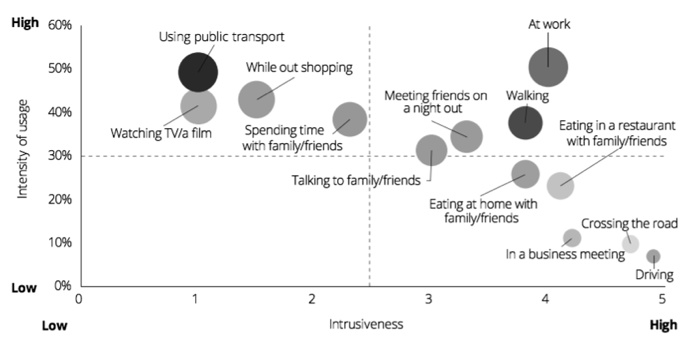This is an excerpt from my research/project at uni last year, sorry for the copy paste, but I believe this part resumes well my views on the impact of this new technology on our lives … sometimes people tend to forget that language and books are technology as well! An ancient ‘vehicle’ to express ideas, emotions, build up communities, intellectual engagement… I would love to hear more about the psychology behind it, all these apps seem to be following game theory approach!
I believe that the way we are mediating our social interactions through technology is diminishing our human experience. As Debord proposes, the development of a modern society in which authentic social life has been replaced with its representation: “All that once was directly lived has become mere representation.”
In his analysis of the spectacular society, Debord notes that “quality of life is impoverished, with such lack of authenticity, human perceptions are affected, and there’s also a degradation of knowledge, with the hindering of critical thought.”
I agree with his views. How is our culture and meaning construction being affected? Some will argue that this behaviour is leading us to a new kind of ignorance. Defined not only by lack of knowledge but also by a growing lack of interest in what surround us. Incapable of questioning the world and distinguish true from false information. Facilitating a systemic production and maintenance of ignorance. This tendency towards automated and accelerated modes of action may undermine structures of reflection and critique - “Reflection is the process of knowing what we know. It is the only chance we have to discover our blindness and to recognize that the certainties and knowledge of others are, respectively, as overwhelming and tenuous as our own… We are keyed to action and not to reflection, so that our personal life is generally blind to itself” (H. Maturana and J.Varela, 2004).
From an anthropological perspective, a culture is defined by shared knowledge, as ‘a system of inherited conceptions expressed in symbolic forms by means of which people communicate, perpetuate, and develop their knowledge about and attitudes toward life’ (Geertz, 1973).
Learning is personal and inheritable collective: we learn with one another.
Culture and nature are one… and, as we surrounded ourselves by screens and our lives seem to fit in half a dozen of inches what is left of life after the screens? There seems to be a crescent disconnection between culture and nature… unprecedented in our human history. _
“Smartphones have become the hub of our daily lives and are now in the pockets of two thirds (66%) of UK adults, up from 39% in 2012. The vast majority (90%) of 16-24 year olds own one; THE 55-64 year olds are also joining the smartphone revolution, with ownership in this age group more than doubling since 2012, from 19% to 50%.” - Source: www.ofcom.org.uk
Usage of smartphones while doing other activities:
Source: Deloitte Global Mobile Consumer Survey, May–Jun 2016
People seem to be more and more addicted to new technologies, more specifically to smartphones. At work, in public transports, in restaurants or at home! They ‘do it’ everywhere, anytime… The more choices technology gives us in nearly every domain of our lives (information, events, places to go, friends, dating, jobs) - the more we assume that our phone is always the most empowering and useful menu to pick from. Is it?
By shaping the menus we pick from, technology hijacks the way we perceive our choices and replaces them with new ones. But the closer we pay attention to the options were given, the more we’ll notice when they don’t actually align with our true needs.
According to Zogby Analytics, 86% of youngsters say their phones never leave their sight, day or night, and 80% say it’s the first thing they do when they wake up.
‘Nomophobia’, a term researchers use to describe the fear of being without a mobile phone. By 2015, there were 280 million smartphone addicts. It would be the fourth most populous country in the world, after China, India, and the United States.
As we spend on average between 3 and 4 hours a day on the internet some will question why, by which means is this behaviour unfolding and spreading at such fast pace? This behaviour is instigated by design.

